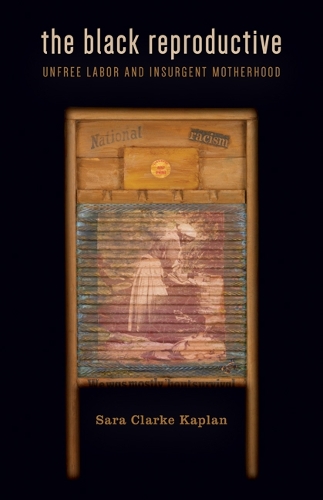
The Black Reproductive: Unfree Labor and Insurgent Motherhood
(Paperback)
Available Formats
Publishing Details
The Black Reproductive: Unfree Labor and Insurgent Motherhood
By (Author) Sara Clarke Kaplan
University of Minnesota Press
University of Minnesota Press
17th August 2021
United States
Classifications
Professional and Scholarly
Non Fiction
Ethnic studies / Ethnicity
Feminism and feminist theory
306.8508996073
Physical Properties
Paperback
280
Width 140mm, Height 216mm, Spine 38mm
Description
How Black womens reproduction became integral to white supremacy, capitalism, and heteropatriarchyand remains key to their dismantling
In the United States, slavery relied on the reproduction and other labors of unfree Black women. Nearly four centuries later, Black reproductivity remains a vital technology for the creation, negotiation, and transformation of sexualized and gendered racial categories. Yet even as Black reproduction has been deployed to resolve the conflicting demands of white supremacy, capitalism, and heteropatriarchy, Sara Clarke Kaplan argues that it also holds the potential to destabilize the oppressive systems it is supposed to maintain.
The Black Reproductive convenes Black literary and cultural studies with feminist and queer theory to read twentieth- and twenty-first-century texts and images alongside their pre-emancipation counterparts. These provocative, unexpected couplings include how Toni Morrisons depiction of infanticide regenders Orlando Pattersons theory of social death, and how Mary Princes eighteenth-century fugitive slave narrative is resignified through the representational paradoxes of Gayl Joness blues novel Corregidora. Throughout, Kaplan offers new perspectives on Black motherhood and gendered labor, from debates over the relationship between President Thomas Jefferson and Sally Hemings, to the demise of racist icon Aunt Jemima, to discussions of Black reproductive freedom and abortion.
The Black Reproductive gives vital insight into the historic and ongoing conditions of Black unfreedom, and points to the possibilities for a Black feminist practice of individual and collective freedom.
Reviews
"The Black Reproductive is a stunning work of theory and criticism. Sara Clarke Kaplan skillfully shows us how the appropriation, management, and policing of Black procreative, domestic, and quotidian reproduction has been a key mode of anti-blackness and, at the same time, a site of possibility for the articulation and practice of Black freedom. With keen attention to a wide range of policies, practices, and Black feminist refusals of the Black reproductive, Kaplan unfolds a moving story of the Black womans body and its reproductive labor as the scene of death and theft but also defiance and fugitivity. This brilliant elaboration of the Black reproductive not only challenges our concepts for analyzing anti-black terror but also reveals how Black women writers and artists effect a glitch in the machine of the Black reproductive, the very machine of terror. This is deep, urgent, moving scholarship for our time."Erica R. Edwards, Rutgers University
"If the control of Black reproduction has been central to conditions of Black subjection, Sara Clarke Kaplans The Black Reproductive argues that a vision of Black freedom requires contending with the reproductive. She stages provocative readings of literary and cultural texts that emphasize the urgency of reading Black freedom through the lens of reproduction. Ultimately, Kaplan offers a vision of Black feminist theory that points us toward imagining collective freedom."Jennifer C. Nash, Duke University
Author Bio
Sara Clarke Kaplan is associate professor of ethnic studies and critical gender studies at the University of California, San Diego, and cofounder of UCSDs Black Studies Project. Her writing has been published in a number of journals, including American Quarterly, American Literary History, Callaloo, and the Journal of Black Women, Gender, and Families.
